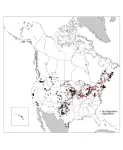(Press-News.org) A University of Texas at Arlington research team has received a $450,000 grant from the National Institute of General Medical Sciences to use statistical machine learning to review patient data and better predict which patients will need additional treatments.
“With recent advances in screening, diagnosis and treatment, many diseases like cancer or cardiovascular disease can be identified in an early stage,” said Suvra Pal, associate professor of statistics in the Department of Mathematics. “Fortunately, a significant proportion of patients living with these diseases will clinically be cured, meaning they will never experience recurrence, metastasis or death due to their primary disease. Our research aims to better identify which patients will be cured so treatment teams can focus on those who will need additional interventions.”
The aim of Pal’s project is to develop a novel statistical model that looks at the time to occurrence of an event, such as when a disease comes back, along with other patient-related characteristics. The team, which includes co-investigator Souvik Roy, assistant professor of mathematics, will then develop an algorithm using machine learning that will sift through the enormous volume of patient data collected by health care systems to predict who will be cured. The model will be considered successful if its predictive accuracy is at least 85%.
“There are existing algorithms that attempt to predict who will be cured based on patient-related characteristics,” Pal said. “Unfortunately, these algorithms come with several drawbacks that make them hard to meet the increasing needs for advanced applications. Our algorithm, based on advanced modeling strategies, circumvents the drawbacks with existing algorithms, and it will be developed into a software for free and nonprofit use.”
Pal also aims to expose underrepresented and minority undergraduate students to this type of research.
“This project will help build a unique integration of statistical expertise and biological significance in the research career of undergraduate students,” said Pal. “Our trainees will have a stronger foundation and be better equipped with interdisciplinary and multidisciplinary trainings for cutting-edge academic and industrial careers.”
The long-term goal of Pal and colleagues is to develop more powerful models that can predict which diseases will be cured to better direct resources to the right efforts. This project will also lay the foundation of Pal’s plan to develop a Center for Integrative Biostatistical and Experimental Research at UTA.
END
Algorithm would predict disease relapses
Federal grant supports UTA efforts to improve precision medicine
2023-09-25
ELSE PRESS RELEASES FROM THIS DATE:
Exercise-mimicking drug sheds weight, boosts muscle activity in mice
2023-09-25
A brand-new kind of drug, tested in mice, shows promising new results that could lead to the development of a new weight-loss drug that mimics exercise.
The new compound, developed and tested by a University of Florida professor of pharmacy and his colleagues, leads obese mice to lose weight by convincing the body’s muscles that they are exercising more than they really are, boosting the animals’ metabolism.
It also increases endurance, helping mice run nearly 50% further than they could before. All without the mice lifting ...
Did life exist on Mars? Other planets? With AI's help, we may know soon
2023-09-25
Scientists have discovered a simple and reliable test for signs of past or present life on other planets – “the holy grail of astrobiology.”
In the journal Proceedings of the National Academy of Sciences, a seven-member team, funded by the John Templeton Foundation and led by Jim Cleaves and Robert Hazen of the Carnegie Institution for Science, reports that, with 90% accuracy, their artificial intelligence-based method distinguished modern and ancient biological samples from those of abiotic origin.
“This routine analytical method has the potential to revolutionize ...
Wind energy projects in North America are more likely to be opposed by white, wealthy communities
2023-09-25
(Santa Barbara, Calif.) — Wind energy is, by far, the most common type of clean energy. And transitioning to clean energy is critical to addressing the climate crisis. Yet local opposition poses a significant barrier to the deployment of wind energy projects.
A study published in Proceedings of the National Academy of Sciences (PNAS) by researchers from UC Santa Barbara, the University of Michigan and Gallup Inc. examined wind energy projects throughout the United States and Canada to determine how common opposition is and what factors predict it. The study found that nearly one in five projects faced opposition ...
Naming and shaming can be effective to get countries to act on climate
2023-09-25
Enforcement is one of the biggest challenges to international cooperation on mitigating climate change in the Paris Agreement. The agreement has no formal enforcement mechanism; instead, it is designed to be transparent so countries that fail to meet their obligations will be named and thus shamed into changing behavior. A new study from the University of California San Diego's School of Global Policy and Strategy shows that this naming-and-shaming mechanism can be an effective incentive for many countries to uphold their pledges ...
Scientists develop method of identifying life on other worlds
2023-09-25
Humankind is looking for life on other planets, but how will we recognise it when we see it? Now a group of US scientists have developed an artificial-intelligence-based system which gives 90% accuracy in discovering signs of life.
The work was presented to scientists for the first time at the Goldschmidt Geochemistry Conference in Lyon on Friday 14th July, where it received a positive reception from others working in the field. The details have now been published in the peer-reviewed journal PNAS (see notes for details).
Lead researcher Professor Robert Hazen, of the Carnegie Institution’s Geophysical ...
Caribbean parrots thought to be endemic are actually relicts of millennial-scale extinction
2023-09-25
In a new study published in PNAS, researchers have extracted the first ancient DNA from Caribbean parrots, which they compared with genetic sequences from modern birds. Working with fossils and archaeological specimens, they showed that two species thought to be endemic to particular islands were once more widespread and diverse. The results help explain how parrots rapidly became the world’s most endangered group of birds, with 28% of all species considered to be threatened. This is especially true for parrots that inhabit islands.
On ...
CSIC contributes to deciphering the enigmatic global distribution of fairy circles
2023-09-25
One of the most impressive and mysterious natural formations that we can observe in the arid areas of our planet are the fairy circles. These are enigmatic circular patterns of bare soil surrounded by plants generating rings of vegetation, which until now had only been described in Namibia and Australia. Over the years, multiple hypotheses have been proposed to explain their formation, which have given rise to numerous discussions about the mechanisms that give rise to them. However, until now, we did not know the global dimension of this type of phenomena and the environmental ...
Insilico Medicine and University of Cambridge present new approach to discover targets for Alzheimer’s and other diseases with protein phase separation
2023-09-25
New York and Cambridge, UK -- Recent research demonstrates that protein phase separation (PPS) is widely present in cells and drives a variety of important biological functions. Protein phase separation at the wrong place or time could create clogs or aggregates of molecules linked to neurodegenerative diseases like Alzheimer’s and Parkinson’s, and poorly formed cellular condensates could contribute to cancers and might help explain the aging process.
Given the emerging association between human disease and the PPS process, scientists have been looking for ways to identify potential targets for therapeutic interventions based on PPS regulation. Today, Insilico ...
Antibiotics can help some bacteria survive for longer
2023-09-25
Scientists have found a surprising effect of some antibiotics on certain bacteria – that the drugs can sometimes benefit bacteria, helping them live longer.
Until now, it has been widely acknowledged that antibiotics kill bacteria or stop them growing, making them widely used as blanket medication for bacterial infections. In recent years, the rise of antibiotic resistance has stopped some antibiotics from working, meaning that untreatable infections could be the biggest global cause of death by 2050.
Now, researchers at the University of Exeter have shown for the first time that antibiotics ...
New method can improve assessing genetic risks for non-white populations
2023-09-25
A team led by researchers at Johns Hopkins Bloomberg School of Public Health and the National Cancer Institute has developed a new algorithm for genetic risk-scoring for major diseases across diverse ancestry populations that holds promise for reducing health care disparities.
Genetic risk-scoring algorithms are considered a promising method to identify high-risk groups of individuals who could benefit from preventive interventions for various diseases and conditions, such as cancers and heart diseases. ...
LAST 30 PRESS RELEASES:
Yale study challenges notion that aging means decline, finds many older adults improve over time
Korean researchers enable early detection of brain disorders with a single drop of saliva!
Swipe right, but safer
Duke-NUS scientists identify more effective way to detect poultry viruses in live markets
Low-intensity treadmill exercise preconditioning mitigates post-stroke injury in mouse models
How moss helped solve a grave-robbing mystery
How much sleep do teens get? Six-seven hours.
Patients regain weight rapidly after stopping weight loss drugs – but still keep off a quarter of weight lost
GLP-1 diabetes drugs linked to reduced risk of addiction and substance-related death
Councils face industry legal threats for campaigns warning against wood burning stoves
GLP-1 medications get at the heart of addiction: study
Global trauma study highlights shared learning as interest in whole blood resurges
Almost a third of Gen Z men agree a wife should obey her husband
Trapping light on thermal photodetectors shatters speed records
New review highlights the future of tubular solid oxide fuel cells for clean energy systems
Pig farm ammonia pollution may indirectly accelerate climate warming, new study finds
Modified biochar helps compost retain nitrogen and build richer soil organic matter
First gene regulation clinical trials for epilepsy show promising results
Life-changing drug identified for children with rare epilepsy
Husker researchers collaborate to explore fear of spiders
Mayo Clinic researchers discover hidden brain map that may improve epilepsy care
NYCST announces Round 2 Awards for space technology projects
How the Dobbs decision and abortion restrictions changed where medical students apply to residency programs
Microwave frying can help lower oil content for healthier French fries
In MS, wearable sensors may help identify people at risk of worsening disability
Study: Football associated with nearly one in five brain injuries in youth sports
Machine-learning immune-system analysis study may hold clues to personalized medicine
A promising potential therapeutic strategy for Rett syndrome
How time changes impact public sentiment in the U.S.
Analysis of charred food in pot reveals that prehistoric Europeans had surprisingly complex cuisines
[Press-News.org] Algorithm would predict disease relapsesFederal grant supports UTA efforts to improve precision medicine






